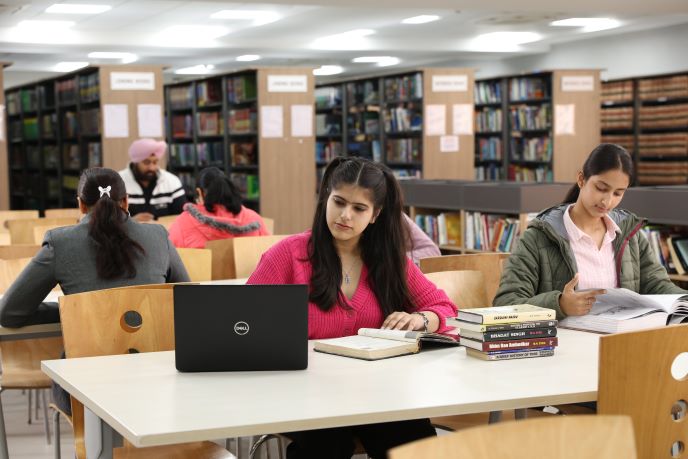
By Prof. Rahul Nainwal, Director, School of Business, UPES
 In an age where digital transformation is reshaping every aspect of life, the education sector is no exception. The traditional classroom is being supplemented, if not entirely replaced, by online education courses that cater to the evolving needs of today’s learners. This shift is not merely about convenience or the allure of technology; it’s about developing holistic and future-ready learners equipped to thrive in an unpredictable world.
In an age where digital transformation is reshaping every aspect of life, the education sector is no exception. The traditional classroom is being supplemented, if not entirely replaced, by online education courses that cater to the evolving needs of today’s learners. This shift is not merely about convenience or the allure of technology; it’s about developing holistic and future-ready learners equipped to thrive in an unpredictable world.
What this means is, that online education is no longer a novelty; it’s a necessity. Post COVID-19, what was once seen as a stopgap solution, became a cornerstone of modern education. As Bill Gates, co-founder of Microsoft, aptly noted, “Technology is unlocking the doors to education. It is revolutionising the way we learn and interact.”
Online education is more than just a trend; it’s a transformative force that is reshaping the future of learning. By promoting holistic development and equipping learners with the skills needed for the future, online courses are playing a crucial role in preparing the next generation for the challenges and opportunities that lie ahead.
Online Learning Encourages Innovation and Creativity
Innovation and creativity are vital for preparing students to thrive in a dynamic workforce. Higher Education Institutions (HEIs) support this by partnering with industry and foreign universities to align their curriculum with real-world demands. This approach gives students insights into cutting-edge technologies under expert guidance, while project-based learning and interdisciplinary courses foster innovative thinking.
Holistic education further nurtures intellectual, emotional, social, physical, and ethical development. Thoughtfully designed online courses add flexibility, allowing students to balance studies with activities like internships, promoting a well-rounded lifestyle. Though some question online learning, its focus on self-directed education enhances critical thinking and problem-solving skills.
Technology-Driven Approach Impacts Online Learning Experience
Technology has been a pivotal factor in the evolution of online education’s role. Various tools and platforms are being leveraged to enhance the learning experience, making it more interactive, personalised, and effective. AI platforms tailor content and provide instant feedback, enhancing student outcomes while VR/AR tools offer immersive experiences, allowing students to explore concepts and practice skills safely. Now, gamification platforms are also important channels to engage learners, while the advent of blockchain technology ensures the security and credibility of educational credentials. Additionally, adaptive learning technologies, personalise instruction based on student performance, helping learners progress at their own pace.
Upskilling and reskilling with the changing dynamics of the industry
As per the demands of Industry 4.0, companies now seek multi-skilled professionals who can swiftly adapt to changes and deliver innovative solutions to maintain a competitive edge. They look to acquire talent with deep knowledge and with a willingness for lifelong learning and upskilling through non-traditional methods and online learning. According to a research conducted by a recruitment platform, in the next five years, 40% of Indian employees will require reskilling, and 60% will require upskilling to be competent.
There is no denying the fact that upskilling and reskilling are imperative to the growth of students and professionals. In a recent study published by a business intelligence provider, seven out of ten employees (i.e. 70%) report that their present job performance had improved as a result of upskilling. Additionally, upskilling and reskilling have had a high influence on enabling 72% of Indian employees find more rewarding careers. By creating an environment of continuous learning, online education is helping learners expand capabilities and gain access to cross-domain knowledge, while accumulating useful insights that may help them elevate their positions or even change their field of career altogether.
Future-Readiness: Equipping Learners for Tomorrow’s Challenges
In today’s rapidly changing world, traditional education models and standardised testing are increasingly inadequate for preparing students for the future. Online education addresses this gap and promotes digital literacy, a vital 21st-century skill, by encouraging students to engage with digital tools and platforms. Moreover, the global reach of online education enables students to interact with peers from diverse cultures, enhancing their intercultural competence, collaboration, and innovation skills.
As we embrace the digital age, the ultimate goal for education needs to be the creation of a learning environment that is inclusive, dynamic, and helps students and talent that is future-ready.
Addressing Challenges and Motivations for Online Education
Online education offers great potential but faces challenges like limited face-to-face interaction, technical issues, and distractions. For effective learning, students must take responsibility for self-discipline, time management, and active engagement.
People opt for online learning for flexibility, career advancement, and convenience. Other motivations include interactive learning, access to global experts, and cost-effectiveness. By addressing the challenges and understanding motivations, institutions can enhance online learning experiences.










